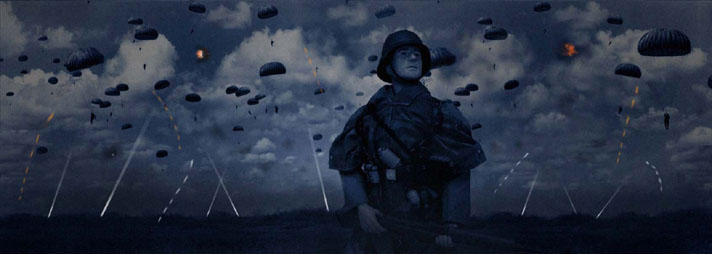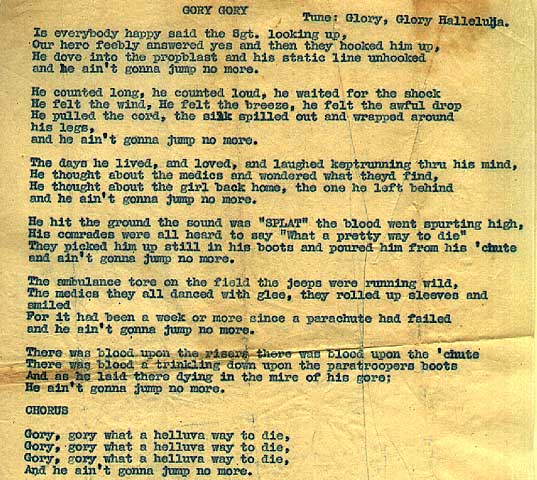|
A gigantic, lethal game of hide-and-seek
Over ten thousand Americans were taking part in a gigantic and lethal game of hide-and-seek, and probably at least five thousand Germans. It covered an area over ten miles square, and grim isolated games were being fought twenty and twenty-five miles away from the centre. in this unique contest, the Americans knew what was happening, but few of them knew where they were; the Germans knew where they were... but none of them knew what was happening. The D-Day invasion began with a dangerous night attack by American and British paratroopers who were dropped behind enemy lines to soften up the German troops and to secure vital targets. The American 101st and 82nd U.S. Airborne Divisions, departing from Portland Bill on the English coast, were dropped on the Cherbourg peninsula, France. The objective of the 101st "Screaming Eagles" was to capture the inland ends of the causeways which led from the beach; to capture or destroy the bridges and a lock on the River Douve, and so protect the southward flank of the area; and to form a defensive line towards the north. The 82nd "All American," landing farther inland, was to drop on both sides of the River Merderet, a small tribuary of the Douve. It was to capture the town of Sainte-Mére-Eglise and so cut the main road and railway from Carentan to Cherbourg; and to capture intact two bridges across the Merdere and a wide area beyond it, which could be used by the seaborne forces in a westward drive to cut the peninsula itself. Although the airborne divisions fulfilled their general role of protecting the landing on UTAH, their successes, with one exception, were not so quick or so spectacular. Heavy fog and German guns proved formidable challenges and the pilots were unable to drop the paratroopers precisely as planned. The 101st Division suffered great losses. Only one sixth of the men reached their destination points. The first regiment of the 82nd Division fared better, but the second regiment suffered heavy supply losses -- much of the division was left without sufficient arms. Still, both divisions managed to form smaller improvised squads, and organized themselves to wage a fight. By 0430, the 82nd had captured the town of Ste-Mere-Eglise.
|


Edwin Müller - Azeville, Cherbourg
In the peninsula of Cherbourg, the German 709th Infantry Division had been waiting for a year, scattered in farms and villages along thirty miles of the channel coast and in the countryside behind it. It was a force without much pride or much cohesion. It had been formed eighteen months before, with a core of German veterans from the Russian front and a large proportion of more or less unwilling conscripts. Of course, it was far from typical of the German Army: but the German Army, defending Hitler’s vast perimeter, and weakened by its losses in Russia and Africa, was stretched too far and was forced to use motley divisions like this to man the static defences of the Atlantic Wall.
The whole division knew that invasion was coming, and knew there was a chance it might come on their stretch of the coast. Probably very few of them thought they could stop it if it came, with the weapons and organisation they possessed. They were given pep-talks by their brigade commanders, aimed not at increasing their faith in themselves, but at persuading them that they could count on good support. They were told that the coastal artillery batteries were powerful enough to control the whole shore, and that secret weapons existed which would not be used unless an invasion came, but then would destroy it before it reached the land. Some of them - but only some - believed this.
These unhappy men, divided against each other, far from their homes in an alien land among resentful people, were scattered as usual in their posts and billets on the night of the 5th of June, with no suspicion that their doom was already approaching; for nobody had warned them.
About midnight an air-raid alert was sounded in their district. That was nothing unusual. There had been one already, earlier in the evening, which had only lasted for half an hour; and indeed there had not been many nights in the past few weeks without a warning. It was merely a nuisance. But in one section of an infantry platoon, stationed on a farm south-east of the town of Montebourg, a soldier named Edwin Müller began to wonder whether something more than an ordinary air-raid might be brewing, because there seemed to be so many aircraft overhead, and because some of them were showing lights. Soon after midnight, an order was passed round to fall in on the road and march to a village called Azeville. Few of them had ever been to Azeville, although it was their battalion headquarters.
The order surprised them, but it also reassured htem. On exercises in the past, they had always carried blank ammunition in their rifles and the pouches of their equipment; their live ammunition was stowed in their haversacks. They had always supposed they would know the real thing when it came because they would get the order to load live rounds. But nobody gave them the order that night, so they set out on their m arch with blanks still in their rifles, believing the whold thing was another boring and ill-timed exercise.
The first shock and disillusionment came on the outskirts of Azeville. They were shot at from the churchyard in the middle of the village, and the ammunition was unquestionably live.The whole platoon dropped into ditches beside the road, and without waiting for order they delved in their haversacks and reloaded their pouches and guns; and then, led on by their NCOs, they crept forward by devious routes to surround the churchyard. An eerie battle of hide and seek began against the unknown enemy hidden among the gravestones.
Men with their nerves on edge fired at any shadow which seemed to move or to have a human shape: and sometimes the shadows returned their fire. Very slowly, from grave to grave, the Germans crawled in towards the church. As they closed their ranks, dark figures dashed out between them and escaped, and the firing died away; but by the porch a man was lying dead: and Müller, looking down at him, recognised the equipment of an American parachutist and knew the day had come.
Events moved swiftly in Azeville after that, towards a dawn which Müller was to remember with horror all his life. The platoon was posted round the village to defend it, under the disadvantage that the men had never seen the place in daylight and did not know their way about it.. Müller and another man were placed at a garden gate in a hedge and told to keep watch; and peering nervously over that gate; entirely ignorant of what they might expect, they witnessed a spectacle which they had never imagined at all: for all of a sudden the whole night sky to the south and west was filled with uncountable parachutes.
Müller and his companion stood there and watched them, with awe and with a certain admiration for an army and airforce which could launch an attack of such majestic size. They believed from the moment they saw it that they were beaten; for the force and efficiency which they knew must lie behind it were far beyond anything they had ever experienced in their inferior division. Some of the parachutists drifting down were within an easy rifle shot, but the two Germans, inexperienced as they were in total war, were held spellbound by an instinctive feeling that it was undair to shoot a man on a parachute. So they simply watched them come to earth.
Extracted from Dawn of D-Day by David Howarth
|
Parachute Training Briand Beaudin 508th Parachute Infantry Regiment, U.S. 82nd Airborne Division
I spent four years in ROTC at Georgetown Medical School and was graduated as a physician and first lieutenant on May 25, 1942. On August 13, 1943, I was inducted in the U.S. Army as a first lieutenant and given orders to report to Carlisle Barracks in Pennsylvania for six weeks of military medical training, to be followed by reporting to the 97th Infantry Division at Camp Swift in Bastrop, Texas. After four weeks at Carlisle Barracks, a paratroop medical officer with rank of captain appeared at all our classes. He informed us that the parachute troops were looking for volunteers and invited us all to a meeting that night, where the concept of parachute troops would be explained and jump paraphernalia would be shown, as well as an up-to-date training film. About four hundred medics showed up that evening. After the talk and viewing of the equipment, about three hundred were left. After the film, only twelve were present. Of these twelve, after physical exams, I was one of four who were chosen. I had volunteered for three reasons. First, I had always had a serious fear of heights, even to the point of walking to the center of the road if there was a precipice or waterfalls along the sidewalk--especially on a bridge! Second, the extra hundred dollars a month sounded very good. Third, there was a matter of pride, and the knowledge that this training would cure me of my fears--or kill me. On the Friday night of my third training week, a plane's propeller dropped off and the C-47 crashed, killing all passengers. I was determined after that that when my turn came for a night jump a week later, I would sit in my normal position across from the door, and if the motors began to fail, I would immediately jump out the door. When I received my parachute wings I wrote to my parents, who learned for the first time that I had been at Fort Benning to get parachute training. I was made assistant battalion surgeon and assigned to the 3rd Battalion, 508th Regiment. |
|||||
 |
|||||
|
Parachute Assault Training, 1944 Edward Boccafogli 508th Parachute Infantry Regiment, We trained very hard in preparation for the Normandy invasion. The people in Nottingham treated us pretty well. The food was not too good but the beer wasn't bad and also, naturally, the girls. We were billeted in tents in Nottingham--the Robin Hood village, and while we were there, naturally, it was cold weather, and we took some of the leaves off the trees, which eventually the United States had to pay for. Coal was very scarce, and it was very cold at night. But we trained hard and made a few extra jumps. Then eventually word started to get around that it was getting close to the invasion. On June 4, we got word and we knew that the thing was going to come off. We knew that it was going to be very, very tough. Most of us were actually writing letters home, and many of the letters were censored, and naturally they wouldn't get to the United States until after the invasion. We were transferred over to Folkingham Aerodrome, and there we were billeted in the hangars and in the tents, and then we got more equipment. The equipment that we had received at that time was grenades and--my God, we had everything. We had .30-caliber ammunition, and plenty of it. Four grenades per man, four bandoleers of ammunition, a Gammon grenade, two pounds of TNT, blasting caps, one land mine, Mae West, knife, bayonet, four K-rations, helmet, parachute, and spare, and then the musette bag. I think it all weighed somewhere around eighty pounds, and that alone took some of the spunk out of us. |
|||||